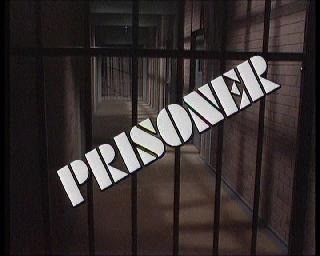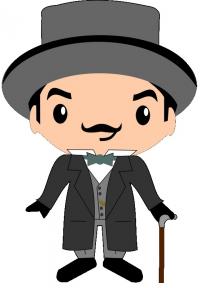The Prisoner #007: More on "Who runs the Village?"

Date: Saturday, 19 October 1985 09:24 mst
From: allegra!sjuvax!iannucci at SEISMO.CSS.GOV (D. Iannucci)
Subject: Prisoner #007
To: Lippard at MIT-MULTICS
The Prisoner #007 10/19/85 Moderator: Dave Iannucci (iannucci@sjuvax.UUCP)
Topics
- More on "Who runs the Village?"
- Nuclear interpretation and the rocket
- A bit about the Prisoner books
=======
I am willing to go out on a limb here and state some "weird" ideas about The Prisoner. What if every show was meant to represent a different thing. There has been a lot of talk about the continuity of the show considering the fact that there were different writers for some of the show.
I maintain that there could be different writers and still continuity since Patrick McGoohan was the overseer of all the episodes. I believe that each episode conveys a different aspect of one major theme. This major theme could be the representation of society as the Village.
Example 1.
- Free for All (the election episode).
- This episode could be a representation of the election process.
- This episode would have no other ties to the series except that the idea of number 6 in the Village would remain the same.
Example 2.
- The General
- This episode could be a statement against computers.
- I would like to hear what others have to say about this possibility.
About the missile/rocket in the final episode. I feel that the rocket was an afterthought thrown into the episode. I also feel that the expected effect was never produced. It could be a hurried attempt to make the show more relevant by including a reference to nuclear war. I feel that this effort failed miserably.
John A. Giorgi / Saint Joseph's University
{allegra | astrovax | bpa | burdvax}!sjuvax!giorgi
The sands of time were eroded by the river of constant change.
Banks/Collins/Gabriel/Hackett/Rutherford
=======
A couple of comments on some things raised in issue #6.
Re Ross Alford's comments about who runs the Village:
One simple explanation is that when first plotted, the show was to be a traditional spy thriller, so "the other side" DID run the Village. But as it went on, the series grew into the allegory and so the rulers of the Village "changed" into the Number One seen during "Fall Out". But, since this is going outside the world of the Village, let's discount it and try for something else.
I think Cobb's appearance at the beginning was a foreshadowing of what the series was about. Cobb disappeared from his world and entered the world of the Village -- he was alone, alienated from what he knew, just as the Prisoner was alone. But Cobb's character represented the masses in society too -- his in- dividuality was not so strong as the Prisoner's, and Cobb was broken; he surrendered his individuality to conform to the societal norm of the Village. This serves as an early indication of what the Village wants, and of what it will try to do to the Prisoner.
Re Dave Iannucci's remarks about "Once Upon A Time":
It looked like a transference of some kind -- at the end, Number Two became Number Six and vice versa. When Number Six locks Number Two in the cage, it becomes pretty clear Number Two has lost control and Number Six has gained it. Now, at the very beginning, Number Two told Number Six, "Only one of us will survive this. One week, and we shall see who is the stronger, you or I" (or words to that effect.) At the end of the week, Number Two fully expected to be able to break, and kill, Number Six. Hence, I thought he had made that recording and set it to play at what he anticipated would be the climactic moment. Unfortunately, he was right -- but by that time he had assumed the role of prisoner, and Number Six the jailer. And so he "died".
As for the rocket (by the way, did anyone else notice the trick photography was pretty bad -- the rocket was supposed to be rising behind the house, but the flame was clearly visible on it?), I read its launch as the Prisoner's "casting out" the forces that constrained him to conform. This seems quite appropriate, as I think the final sequence is the same as the one in the opening credits -- he's breaking with his society by resigning. (Implicit in this is that the entire story took place only in his mind, I suppose.) I prefer this to the nuclear interpretation because it's far more timeless -- it's the type of thing that is endemic to any human society, and not just the modern one. (Dave, this is not to say you're wrong, by any means!) Anyway, food for thought.
Be Seeing You,
Matt Bishop (mab@riacs.arpa)
========
Re: The Prisoner books
I have just finished reading the first one. It is only based on the series and has many major differences. For instance, No. 6 is put to sleep on a train before he wakes up in the Village for the first time. At one point in the book he is sneaking around underground in the Village and comes across some films, one of which is labeled "6-schiz", and watches part of it. It is the episode "The Schizoid Man".
Jim Lippard (Lippard at MIT-MULTICS.ARPA)
========
In Prisoner #006, Ross Alford suggested that the Village is run by the "Other Side". As proof, he offers Cobb from the first episode. I must disagree. I have two reasons for believing that the Village is run (at least in part) by "Our Side".
First, from the introduction we see that number 6 is abducted immediately after resigning. How would the "Other Side" know that he resigned so quickly? Secondly, number 6 is constantly asked, "Why did you resign?". Why would the other side care? Only "Our Side" would care about why number 6 resigned. The "Other Side" would ask something like, "Who are your agents in Moscow?"
As further proof, I offer the end of "Fall Out". Number 2 (Leo McKern (?)) is seen walking into what appears to be a British government office (I think it was the building that houses Big Ben). As he walks in, you hear thunder. The implication is that he is now going to resign (from "Our Side").
I believe that the Village is run by BOTH sides. I also believe that that butler is number 1 (it just seems appropriate that after all that, it all boils down to the oldest cliche in English literature: "The Butler did it").
Be seeing you,
John Muth {ihnp4,hplabs}!amdahl!muth
========
> I read its launch as the Prisoner's "casting out" the forces that constrained him to conform. [Bishop]
I watched `Fall Out' again. When No.6 was twiddling knobs, he was not trying to prevent the rocket from launching, but rather trying to launch it! Accordingly, I am inclined to agree with Matt as to the meaning behind the launch. I am becoming less and less convinced of the nuclear war interpretation, although I still think that it may have been something that was included as an afterthought, as suggested by John G. above.
This seems quite appropriate, as I think the final sequence is the same as the one in the opening credits -- he's breaking with his society by resigning. (Implicit in this is that the entire story took place only in his mind, I suppose.) [Bishop]
I don't quite know what you mean by this, Matt. The only scene I know of that repeats is the one of the Prisoner racing down a deserted road in his little KAR 120C. In `Fall Out', he doesn't seem to do anything that would suggest resignation.
Why would the other side care? Only "Our Side" would care about why number 6 resigned. The "Other Side" would ask something like, "Who are your agents in Moscow?" [Muth]
Oh, I don't know bout that. They might want to know why he resigned in order to gain some insight into what's going on in British Intelligence. The reason why a highly influential agent would suddenly pack it in might be very useful in the world of espionage. Just a thought really...
Something just dawned on me. Another one of those interesting little plot intricacies. Do you remember that in 1UAT, No.6 (at the adolescent stage) gets in trouble for not telling the schoolmaster who was talking in class? He says "I'm a fool, yes, but not a rat." He repeats that line near the end of that show, after he has become the warder and No.2 the prisoner.
If you will recall from previous discussions, the end of the series "Secret Agent" in marked by Drake (No.6?) turning in an agent who was going to defect. He was told to promise the guy that he would be safe from prosecution, but as soon as Drake turned him in, he was ========ay to prison. This disturbed Drake greatly, and it was suggested that this is the reason why No.6 resigned. Could this be what is referred to by the "not a rat" line?? I love finding these little things...:-)
=========
"I'll kill you!"
"I'll die..."
Dave Iannucci @ St. Joseph's University, Philadelphia [40 00' N 75 15' W]
{{ihnp4 | ucbvax}!allegra | {psuvax1}!burdvax | astrovax}!sjuvax!iannucci
END OF Prisoner #007


















